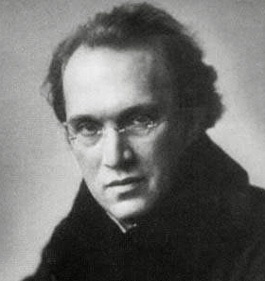Redeeming Schreker – Flammen and Erlösungsoper
In the first of a series on final year projects by this year’s graduates, Harley Mitford describes his dissertation on Schreker’s early opera:

While I was reading around the subject of German opera after Wagner, I came across the little-known Austrian composer Franz Schreker (1878-1934). Initially drawn in by the “decadent”, eclectic pan-European sound of his second opera Der ferne Klang (The Distant Sound, 1912), a melting-pot of contemporary influences from Strauss to Debussy and Puccini, I found that I wanted to hear more and more of his music. This led to me hunting down recordings of his nine operas; most of which have only had one official outing, with only a dodgy bootleg recording of his seventh, Der singende Teufel (The Singing Devil, 1924), available.
Initially I wanted to write my dissertation on the themes and symbols which recur throughout Schreker’s operatic oeuvre, though I soon discovered that this was a little unrealistic within the framework of only 10,000 words. Instead, I settled on his debut opera Flammen (Flames, 1902), as I found it to be a highly sensitive, sophisticated work and therefore unjustifiably dismissed as a mere ‘student work’ (Der ferne Klang is otherwise erroneously labelled as his first opera). Since it hadn’t yet been extensively explored in English (Schreker’s only English-language biographer Christopher Hailey affords the work only a passing mention), I felt it appropriate to make Flammen the sole focus of my dissertation.
The first step, after acquiring Kiel Opera’s world premiere – and Flammen’s only – CD recording, was to locate the score, which had only been assembled from the original manuscript in 2001 for use in the Kiel Opera production. Boosey and Hawkes rented it to me at an admirably affordable rate (I had feared an insurmountable fee), and I was then able to embark on analysing the score, a task which comprised the second chapter of my dissertation. The first chapter served as an introduction to the Wagnerian Erlösungsoper (‘redemption opera’), the genre to which, along with Strauss’s debut Guntram, Flammen belongs. I found, by looking at the state of German opera around 1900, that the philosophy-laden Erlösungsoper – which had continued to dominate the Austro-German operatic scene for a number of years after Wagner’s demise – was severely smarting from the overwhelming invasion of Italian verismo, à la Mascagni, in the 1890s. Therefore it came as no surprise to find that Flammen stood very little chance of being taken up (which, after its initial 1902 piano-vocal premiere conducted by Schreker, and much to his dismay, it never was during his lifetime). This became my starting point for exploring a work which, now that Schreker is experiencing somewhat of a renaissance, deserves a thorough re-evaluation.

The main challenge I faced was not having, apart from Frank Harders-Wuthenow’s excellent liner notes, any Flammen scholarship on which to build. I therefore had to read tentatively between the lines, researching the work of Schreker’s direct contemporaries, as well as fin-de-siècle Vienna, in order to slot him, as best I could, into the surrounding context. I had to accept, then, that my suppositions were always going to be speculative at best. Nonetheless, I found that the challenge spurred me on rather than discouraging me further. Far from answering the questions I had going in, concluding my dissertation only posed more questions, and as I go on to do an MMus here at Southampton I hope my understanding of Schreker – the enigmatic man as well as the extraordinary musician – will continue to develop.

